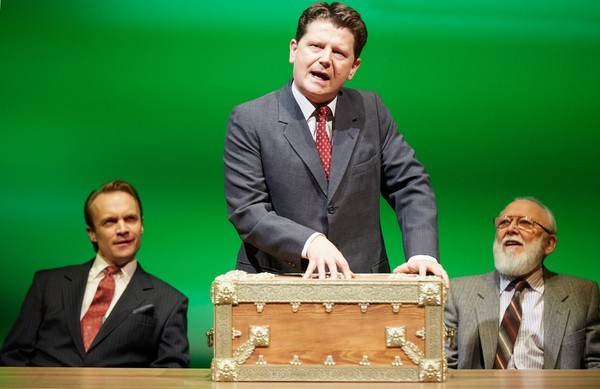The Absence of War (Sheffield Crucible) – impeccably acted and elegantly staged

© Mark Douet
We’ve had four elections since David Hare embedded himself into Neil Kinnock’s doomed election campaign in 1992. The next year, as the final part of his legendary state of the nation trilogy, Hare dramatised the Labour Party’s strife. More than 20 years on, many of the same problems dog Ed Miliband’s lot – not least a leader apparently ill-suited to leadership – but Hare’s play also looks awfully dated. What was once prescient has become obvious.
Today, it works best on a universal level: as a kind of contemporary classical tragedy charting one man’s downfall. Labour leader George Jones is a straightforward, thoughtful, empathetic man; exactly the decent sort you want for PM and, therefore, too decent to actually win power.
Politics has knocked the natural politician out of him – voters never see his dynamism – and when spin-doctors finally tell him to be himself and speak from the heart, he fumbles. His team smile their support in public and sharpen their knives in private, salivating over their own leadership prospects. Played humble and honest as a Ploughman’s Lunch by Reece Dinsdale, George Jones is a good man born to concede defeat gracefully.
Jeremy Herrin, Headlong’s new artistic director, wants us to draw parallels with Ed Miliband and his slapdash Labour party: the internal squabbles and indecisiveness, the pull right to prove its economically credibility, the collapse of the traditional left. He wants us to notice strategic vote-winning policies and the gaggle of spin doctors dictating politics, the leader who just can’t win the public over and the slick, hollow professionalism of the Blairite waiting in the wings, a Labour MP in an MCC tie.
All of that’s still relevant – depressingly – but politics has changed and Hare’s play now looks quaint by comparison. Its pace feels glacial, pre-smart phones and rolling news (Remember Ceefax?) and Hare’s gift for prophecy has actually neutered his play somewhat. The Absence of War pre-empts New Labour with extraordinary foresight – its inherent Thatcherism, its rivalries, its spin factory – but Blair’s leadership made the cynical political machinery so evident that we no longer need Hare to spell it out.
None of this is to fault Herrin’s impeccably acted, elegantly staged production. Mike Britton‘s set drenches the politicians in block colours, as simple as the messages they set out to convey. Cyril Nri makes a rasping, exasperated political advisor; James Harkness, a canny one with a good career to come. Gyuri Sarossy catches all of the palatable pragmatism of the career politician in Labour’s next leader, Malcolm Pryce, and the best scene – the most nakedly Shakespearean – is his snatched showdown with Jones in an isolated aircraft hanger. Good support, too, from Charlotte Lucas as a plain-speaking pollster, from Barry McCarthy as a soft, old-school deputy and from Don Gallagher as the establishment PM, who seems to be everywhere.
What we really need, though, is a new Absence of War: not an ill-fitting, old-school hand-me-down, but a big, incisive political piece capable of measuring up to The Thick of It or The West Wing. This only proves the proverb: Hare today, gone tomorrow.
The Absence of War runs at the Sheffield Crucible until 21st February, then tours. Full dates and details can be found here.










